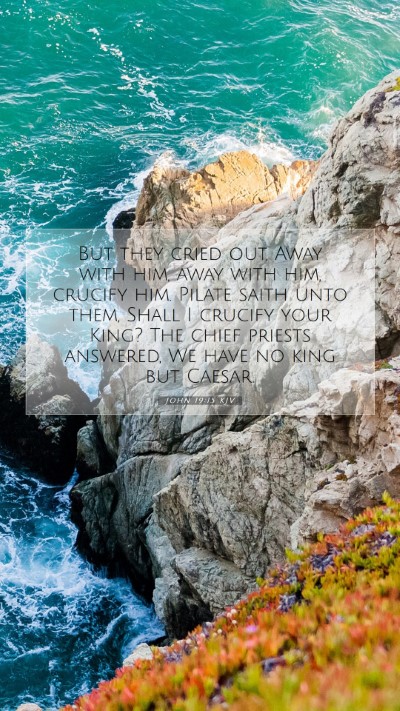Understanding John 19:15: Insights and Commentary
John 19:15 states: "But they cried out, 'Away with him! Away with him! Crucify him!' Pilate said to them, 'Shall I crucify your King?' The chief priests answered, 'We have no king but Caesar!'"
Overview of the Verse
This verse captures a pivotal moment in the Passion narrative, illustrating the intense opposition Christ faced from the religious leaders and the people of Jerusalem, culminating in their demand for His crucifixion. It highlights the rejection of Jesus as the Messiah and King, showcasing a profound breach between divine authority and human choice.
Commentary Insights
-
Contextual Background:
The events leading up to this moment involve Pilate's attempts to release Jesus but are thwarted by the outcry of the crowd instigated by the chief priests, reflecting the political and social climate of the time.
-
Matthew Henry's Commentary:
Henry emphasizes the gravity of the people's rejection, illustrating the contrast between earthly rulers and the divine kingship of Christ. The demand for His crucifixion denotes a failure to recognize His true identity and mission.
-
Albert Barnes' Exegesis:
Barnes notes the paradox of the Jewish leaders rejecting Jesus while affirming loyalty to Caesar, marking a significant theological betrayal. This decision reflects their prioritizing political fidelity over spiritual truth.
-
Adam Clarke's Analysis:
Clarke elaborates on the people's vehement outcry, suggesting that their choice underscores a deeper spiritual blindness and emptiness. The reference to Caesar as their king symbolizes their alignment with worldly powers in opposition to the divine.
Meaning of the Verse
In John 19:15, the choices made by both Pilate and the Jewish people emerge as pivotal. The refusal to accept Jesus as king reveals a rejection of God's plan for salvation. This moment also serves as a landmark for Christians, representing the sacrifice that Jesus would endure for humanity's sake.
Spiritual Themes
-
Rejection of Christ:
The crowd's insistence on crucifying Jesus embodies a broader theme of humanity's rejection of divine truth, illustrating how conflict often arises between spiritual and temporal authorities.
-
The Role of Authority:
Pilate's position exemplifies the earthly authority challenged by divine claims. His reluctance to condemn an innocent man reveals the tension between personal conviction and public pressure.
-
The Nature of True Kingship:
This verse challenges readers to consider the true nature of authority and kingship. While the chief priests align themselves with Caesar, Christians are invited to acknowledge Jesus as their true King, guiding their lives through His teachings.
Application in Daily Life
Understanding John 19:15 invites believers to reflect on their response to Jesus. Are we aligned with worldly standards of authority, or do we recognize His sovereign kingship in our lives? This application encourages a reassessment of priorities in a world filled with competing allegiances.
Cross References
- Matthew 27:22-23 – Jesus before Pilate
- Luke 23:18-21 – The crowd's insistence for Barabbas
- John 18:36-37 – Jesus clarifying His kingdom not being of this world
Final Thoughts
John 19:15 serves as a cornerstone for understanding the rejection of Christ and the implications of that decision for both the Jewish people of Jesus’ time and contemporary believers. This verse calls for a deepened understanding of our interpretation of authority, our kingship under Christ, and our role in the unfolding of God's redemptive plan.
For those engaged in Bible study groups or seeking insightful online Bible study, this verse serves as a rich topic for discussion and a springboard into deeper Bible study lessons.
Engaging with this verse contributes to a broader understanding of Scripture, benefiting from various Bible study tools and Bible study guides. These resources can enhance the exploration of Bible verse explanations, offering participants a meaningful approach to Biblical exegesis.


